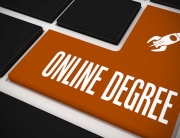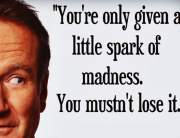Changing education paradigms to free our minds
Our knowledge is the sum of our ancestor’s knowledge added to what we learned in the present. The present is
powerful because it includes new research that will brings us closer to truth and wisdom (if openness, critical thinking and a pinch of common sense is applied).
Our minds stand in the way of an educational revolution
In only a few areas do we see quick behavioural changes in society. We see it with new technology and gadgets inventions that directly facilitates our lives while driving economic wealth. For example, we accepted to replace the Walkman with CDs, CDs with MP3 players… With other words; with new and more useful gadgets, previous gadgets become obsolete.
For scientific discoveries, the process takes a little bit longer. In the structure of scientific revolutions , Thomas Kuhn found out that it normally takes one full generation to make an old idea (a scientific theory that is proven wrong) obsolete. He says that a scientific revolution is only complete when a generation not limited by previous beliefs can compare two models and decide rationally that the new model makes more sense. For politics, it takes even longer; How can do you prove to someone that an abstract concept is wrong? Politics is after all very much influenced by conviction, feelings and ideology. It wouldn’t surprise me if we were talking in centuries or milleniums to see changes there. What can we say about education then?

Well, we keep on talking about a revolution in education. We do, in fact, possess the knowledge and the information to make it happen. With so many great learning strategies and approaches (developed and deciphered by great minds), we have everything to make learning better, easy, fun and fast. And the best part, the ones that want most change are often the ones in power: the politicians and teachers.
Have we seen new educational models or approaches that will render the the current system obsolete? If yes, I need to make more research as I’ve never heard about them yet… If no, what hinders it?
We have unlimited possibilities
As humans, we have the flexibility and imagination to make anything happen, but only as long as we believe in it ourselves. That is especially true for children (which minds are less corrupted than adults) because they have less mental barriers. These barriers are what limits our imagination and our opportunities.
A Norwegian explorer said;
Borders, I’ve never seen one, but I hear they exist in minds of some people .
I believe he is right as I see them everywhere in my mind… But I also believe what Anthony Hopkins expressed in the movie the Edge :
What one man can do, another can do!
Change?
So why don’t we apply our knowledge to change education? I believe familiar questions were asked in different contexts such as: Why won’t people see that the earth is round?
Our limits :The education sector is so structurally organized in a factory assembly production style, that we don’t know how to undo it. And the people most keen on change are also the ones holding change back because it means the loss of power and control. We want change, and we know we need to think differently. But would different ideas get accepted? If I challenged the system with questions such as:
- Does schools need to separate students by age (1st grade, 2nd grade…)?
- Do we need class schedules?
- Do we need grades?
- Do we need classrooms?
- Why don’t we learn students to meditate in school?
- Why don’t we let children learn with computer games like minecraftedu offers?
These questions might or might not be relevant. But it is at least a step closer to thinking differently. Unfortunatelly, although these questions seem innocent, they might just conflict with the belief system of people in power…
Will eLearning tools such as MOOCS revolutionize education?
Lately, I’ve heard many people criticize online learning platforms such as MOOCs. They say they are pure digital reflection of what doesn’t work physically.
There might be some truth to it, and although I am convinced it won’t revolutionize education; it is a big step in the right direction:
- It provides long-life learning to the interested (typically academics).
- It allows people without the means to get a top education from top universities.
- It can massively improve the learning experience to millions of people at the same time by using personalized learning approaches.
Co-founder Daphne Koller talks about how Coursera uses personalization during her Ted Talk . In the video, she mentions that individual tutoring as a far better learning approach than lecture based classrooms . The problem in physical classrooms is that we don’t have the means as a society to provide personal tutoring to every student. But But with online learning and technology, we can offer pre-preprogrammed personalized feedback to millions of users at the same time. That is what Coursera is doing right now!
If the critic of eLearning tools is that they reflect upon a school system that isn’t working (for most people), what do you do? Why just not adapt it to the majority with PERSONALIZATION!
There is something holding back the majority from learning efficiently at schools. My guess is that one of the following is the root cause.
- If you’ve never been good at school, you normally have little motivation to learn, at least at school. You create barriers and tell yourself: I am not good enough, I cannot do this!
- Learning experiences is subjective and different for every student. Students receptability to a teacher is very different.
For that last point, we know very well that people learn differently. Some need to listen, some prefer reading, others need visuals and others need to feel inspired. Most need a combination of several of these factors.
Elearning platforms are currently adapted to the logic of academics and therefore do not appeal to the majority of students. For some students, listening to a monotone (“academic voice”) just turns you off completely. If eLearning companies want to see an increase of student completion rates, personalization is key. One solution is to propose courses based on how well they are adopted to different sensory systems (visual, auditive, kinesthetic…)?
This approach is helpful for many, but it does not help those already unwilling to learn. For those, changes need to arrive on a much earlier level starting already at primary school.
Imagine if all children’s sensory systems would be highly developed? Wouldn’t they be highly receptive to information presented through the the majority of methods? Imagine having the ability to recognize the smell of perfums and flowers, taste the richness of wine and food, visualize mathematics and physics, knowing how to dance because you recognize rhythm… We have a predisposition towards some senses more than the others, having some excellent senses doesn’t exclude all of them from being great!
I envision a system where we develop children senses and a system that doesn’t create mental barriers. his system would ignite their inner drive to learn. With such a system, I believe we would have our educational revolution…
Sources
1. The Structure of Scientific Revolutions – Wikipedia, the free encyclopedia. 2014. The Structure of Scientific Revolutions – Wikipedia, the free encyclopedia . [ONLINE] Available at: http://en.wikipedia.org/wiki/The_Structure_of_Scientific_Revolutions . [Accessed 13 December 2014].
2. The Edge (1997) – IMDb. 2014. The Edge (1997) – IMDb . [ONLINE] Available at: http://www.imdb.com/title/tt0119051/ . [Accessed 13 December 2014]
3. YouTube. 2014. Daphne Koller: What we’re learning from online education – YouTube . [ONLINE] Available at: https://www.youtube.com/watch?v=U6FvJ6jMGHU . [Accessed 13 December 2014].
4. https://wiki.sfu.ca/public/images/3/3a/2011ScienceResBasedPhysicsInstructionOfLargeClasses-1.pdf . [Accessed 13 December 2014].






Leave A Comment